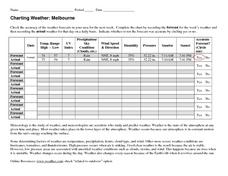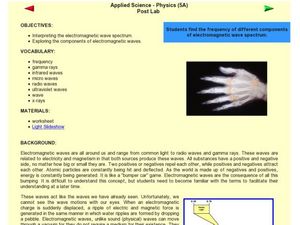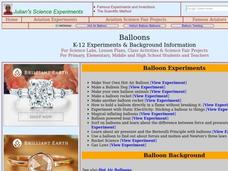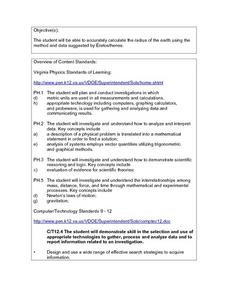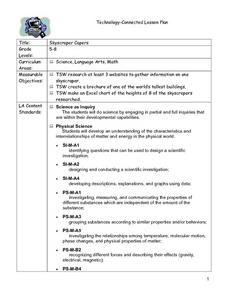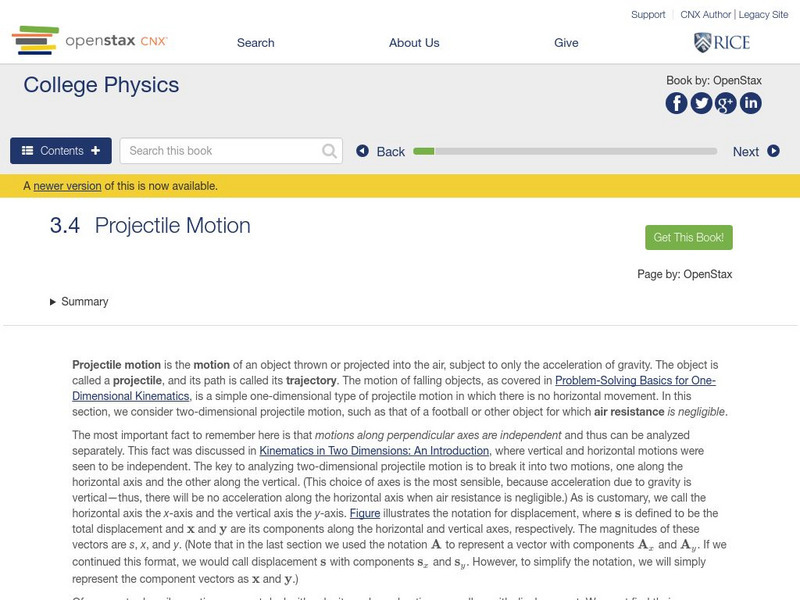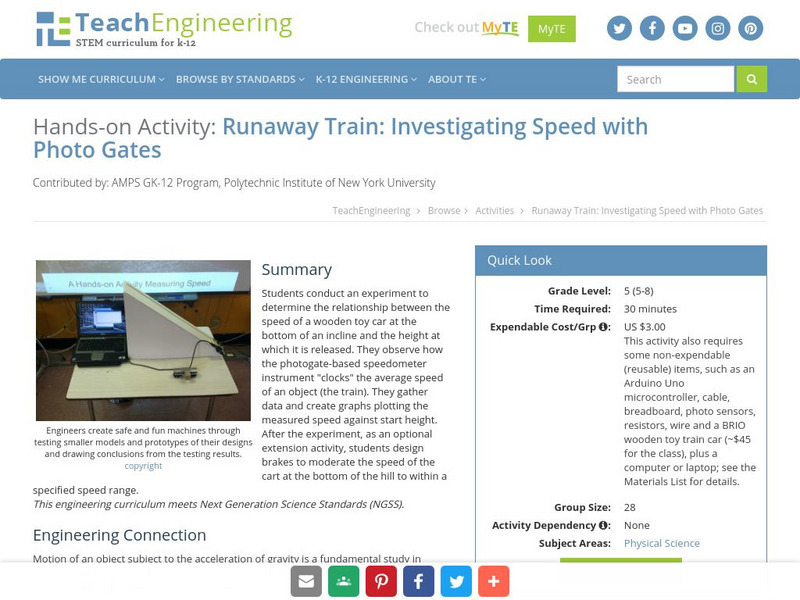Curated OER
School House Rock! Science Rock
Pupils use common household and classroom objects to generate static electricity and study its effects. They discuss the video Science Rock CD called Electricity, Electricity. The video explains many things about electricity.
Curated OER
Quadratics: Polynomial Form
Learners determine how changes in the coefficients in a quadratic function affect its graph. They determine how to use the equation to determine the intercepts of a quadratic function. Students identify the location of the intercepts...
Curated OER
Charting Weather: Melbourne
In this earth science worksheet, learners check the accuracy of the weather forecasts in their area for a week. Then they complete the chart by recording the forecast for the week's weather and then recording the actual weather for that...
Curated OER
Geography Journey
In this geography worksheet, students use a map of Amtrak train routes (not included) to answer 10 short answer questions. Students describe physical features and landmark cities they would see if traveling by train across the country.
Curated OER
Conducting Research
In this train research report, students select one mechanical aspect of a train to write a report. Students fill in the outline with the subject, thesis statement, topic, and details. All research would need to be done on the Internet;...
Curated OER
Electrical Noise and Interference
For this electronics worksheet, students identify and differentiate the different types of noise. They complete 4 short answer questions about the topic.
Curated OER
Electromagnetic Wave Spectrum
Fifth graders examine electromagnetic wave spectrum. In this science lesson, 5th graders discuss the aspects of the electromagnetic wave spectrum and complete a worksheet identifying the parts of the spectrum.
Curated OER
Immersion Presents Monterey Bay
Students study Monterey Bay. In this Monterey Bay instructional activity, students create a model of upwelling around Monterey Bay. Students simulate surface water movement relative to prevailing winds.
Curated OER
Incandescent Light Bulb
Students study the history of the light bulb and how an incandescent light bulb works. In this electricity lesson plan students complete several experiments on the light bulb.
Curated OER
Balloons
Students explore the different types of balloons. In this materials lesson students can complete several experiments including building their own hot air balloons, making balloon animals and experimenting with static...
Curated OER
Seeing Interference Fringes with a Telescope
Students construct an interferometer using a simple telescope. In this physics lesson, students explain how light waves create the fringe patterns. They observe patterns made by different objects in the sky and compare them.
Curated OER
How We See: The First Steps of Human Vision
Students notice how various images and colors update constantly as they are affected by factors such as distance, background and lighting. They also examine how optometrists developed a standard to evaluate eyesight.
Curated OER
Sea Floor Spreading
Students recreate sea-floor spreading and the pattern of magnetic stripes that are created by different configurations of plate boundaries. They see how transform faults work.
Curated OER
Geographic Effects on Precipitation, Water Vapor and Temperature
Students investigate the factors affecting climate using Live Access Server. In this geography lesson, students graph atmospheric data using Excel spreadsheet. They compare and contrast temperature, precipitation and water vapor of two...
Curated OER
Looking into Eratosthenes' Radius of the Earth
Students, in small groups, research Eratosthenes and his calculations of the Earth's radius. They write a summary of the person, the experiments and his calculations to determine how accurate Eratosthenes was in his estimations of the...
Curated OER
Introduction to Melodic Notation: Sol-Mi
Second graders sing melodic sol-mi songs for teacher and student assessment. Emphasis is placed on drill and practice while developing melodic singing skills. Students evaluate performances and activities using pre-determined rubric...
Curated OER
Skyscraper Capers
Students discuss skyscrapers and listen as the teacher introduces the project. They use the Internet to perform research on one skyscraper. Students use information they gather to create a brochure of their building . They create an...
OpenStax
Open Stax: Projectile Motion
The following interactive helps students understan how to identify and xplain the properties of a projectile, such as acceleration due to gravity, range, maximum height, and trajectory. They will determine the location and velocity of a...
Texas Education Agency
Texas Gateway: Kinematics in Two Dimensions: Projectile Motion
By the end of this section, you will be able to identify and explain the properties of a projectile, such as acceleration due to gravity, range, maximum height, and trajectory; determine the location and velocity of a projectile at...
TeachEngineering
Teach Engineering: What Is Newton's Third Law?
Students are introduced to Newton's third law of motion, and then learn that engineers apply Newton's third law and an understanding of reaction forces when designing a wide range of creations, from rockets and aircraft to door knobs,...
TeachEngineering
Teach Engineering: Runaway Train: Investigating Speed With Photo Gates
Students conduct an experiment to determine the relationship between the speed of a wooden toy car at the bottom of an incline and the height at which it is released. They observe how the photogate-based speedometer instrument "clocks"...
Science Buddies
Science Buddies: Project Ideas: Paintball Ballistics
In this science fair project, use a paintball gun to compare the calculated vs. the actual range of a projectile. The Science Buddies project ideas are set up consistently beginning with an abstract, objective, and introduction, followed...
Physics Classroom
The Physics Classroom: Vectors and Projectiles: Maximum Range
Students can imagine a cannonball launched at three different launch angles where the speed is held constant; only the angle is changed. The cannonballs do not encounter a significant amount of air resistance. How will the trajectories...
Curated OER
National Park Service: Thomas Edison National Historical Park: Edison Biography
Here is a very detailed biography of Thomas Edison ranging from his boyhood and his work as a telegrapher, moving on to his invention of the phonograph and incandescent light bulb, and finally, a description of his laboratories where he...


